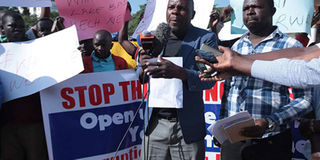Let’s tackle graft causes, not symptoms

Kisumu residents protest against runaway corruption, at Kenyatta sports ground on July 8, 2019. As Kenyans, we must profile the real causes of corruption and confront them head-on. PHOTO | FILE | NATION MEDIA GROUP
What you need to know:
- Political corruption has created massive poverty, leading to a population that is easily manipulated through petty handouts and the peddling of artificial tribal mistrust.
- The key mandate of the EACC is to combat corruption by enforcement, prevention and education but it is now also focusing on asset tracing and recovery.
This week marks the first anniversary of my appointment to the helm of the Ethics and Anti-Corruption Commission.
I undertook a commitment to the public that the EACC will be firm on corruption and that it will be expensive to be corrupt in Kenya.
Many Kenyans are of the opinion that nothing much has been done in the fight against corruption. More so, the country is perceived globally to be one of the most corrupt.
This concern is genuine and there is more to be done for Kenya to be corruption-free. However, we appear to be fighting the symptoms, rather than causes, of graft.
Corruption in Kenya can be divided into three main components, with the third one being more controversial than the other two.
We have grand corruption, usually perpetrated by the powerful individuals who may be politically connected or wealthy and influential.
Grand corruption is lethal but indirectly felt. This includes poorly constructed roads or other substandard public projects that look fine in a short period but start crumbling soon after.
PUBLIC TRUST
Indirectly, many poor countries are paying heavy external debts for services that were not to the full benefit of the citizens due to grand corruption.
Then we have the petty corruption perpetrated by junior citizens, mainly in the public service.
This is openly felt by the citizens — such as harassed of a citizen by police or delayed delivery of relevant services like medical services and issuance of the national identity card.
The third type is the most lethal and is what fuels both grand and petty corruption: political corruption. This is the foundation of corruption.
It is said that many people around the globe — including the most democratic countries, such as India and Brazil — don’t trust their governments.
In Africa, many citizens tend to trust the clergy and the media rather than senior government officials.
POLITICAL GRAFT
Unfortunately, the root cause of political corruption is the public.
We are all up in arms that county governments are corrupt, and the perception out in public is that it is not whether counties are corrupt or not but how deep they are in corrupt activities.
The most unfortunate factor in Kenya is that all county leaderships came to office through the people’s mandate.
They didn’t fall from the skies. It is our choice — not based on performance but other factors such as handouts, ethnic inclination and party waves — that brought these people to power.
Political corruption has created massive poverty, leading to a population that is easily manipulated through petty handouts and the peddling of artificial tribal mistrust.
Government enforcement agencies mandated to fight corruption are trying their best. The multiagency team comprising NIS, EACC, DCI, ODPP, CBK, KRA and others has strengthen its grip on the fight against corruption.
ASSET RECOVERY
Corruption is mostly felt at enforcement level — taking a suspected corrupt official to court.
But the real causes of corruption appear to have spread in all aspects of our lives.
A parent is ready to buy leaked test papers for his child to pass an examination, a motorist is ready to breach traffic rules since he can bribe a traffic police officer and get away with the offence.
We no longer have merit in employment; one has to ‘know’ someone. We use fake academic certificates to vie for political positions. Kenyans believe nothing moves unless you bribe or use influence.
The key mandate of the EACC is to combat corruption by enforcement, prevention and education but it is now also focusing on asset tracing and recovery — a punitive and preventive approach.
It is tracing, restraining, recovering and returning corruptly acquired assets to the public. Recovery of corruptly acquired assets sends a strong message to the culprits.
OVERHAUL LAWS
Previously, corrupt public officials would openly brag about amassing illegally acquired wealth. The public would even glorify them. But this seems to be fading away.
Last year, it recovered assets worth Sh22.56 billion and, through disruption, averted the loss of Sh135 billion from several dubious contracts or tenders that were almost being awarded.
As Kenyans, we must profile the real causes of corruption and confront them head-on. We must overhaul the anti-corruption laws that appear too lenient and ambiguous.
Famed Singaporean prime minister Lee Kuan Yew asserted that no country could win the war against corruption with ‘velvet’ (soft) laws.
While the responsibility of fighting corruption falls squarely on the enforcement agencies, the success in addressing the root causes lies squarely on the public.
Mr Mbarak is the Secretary/Chief Executive Officer, EACC. [email protected].



